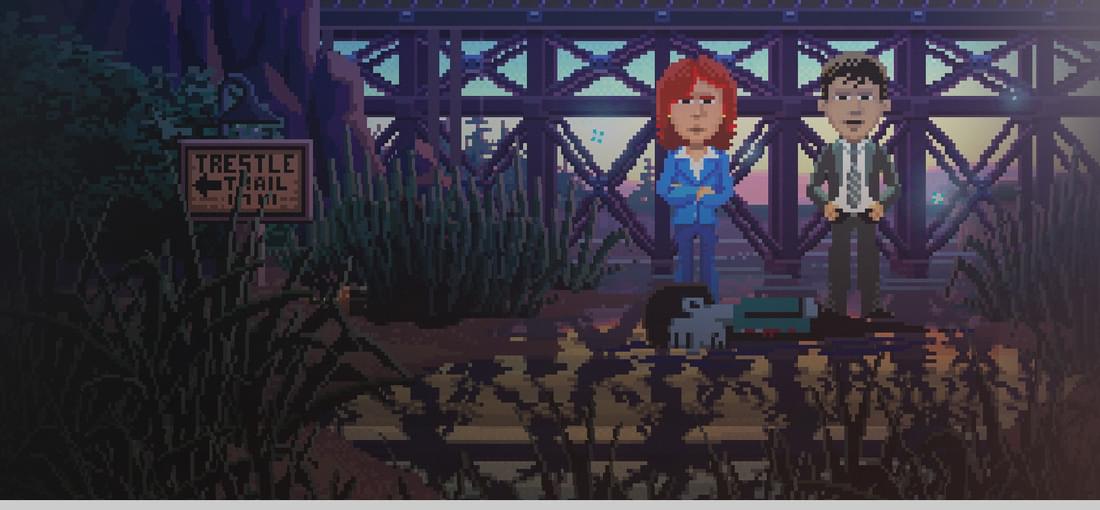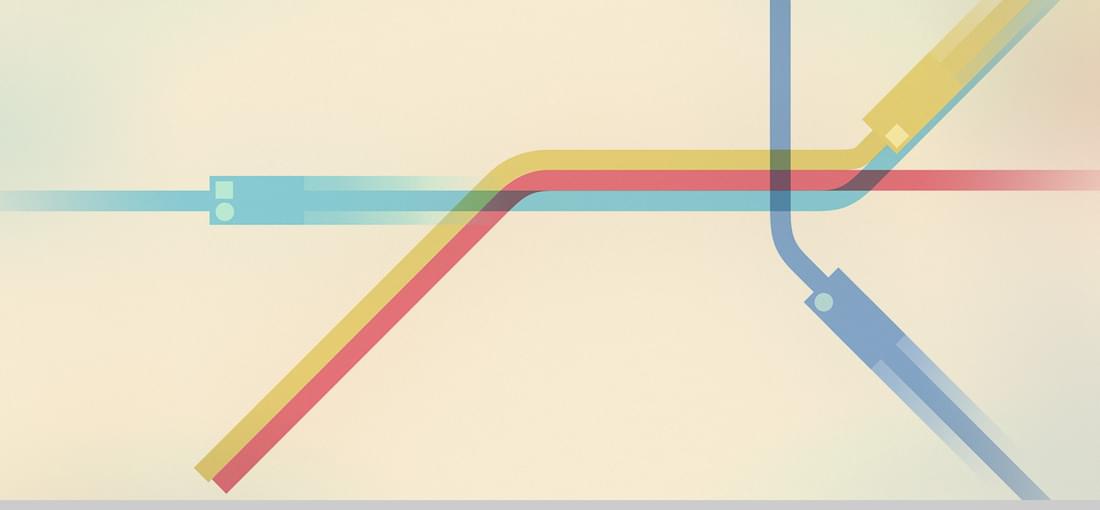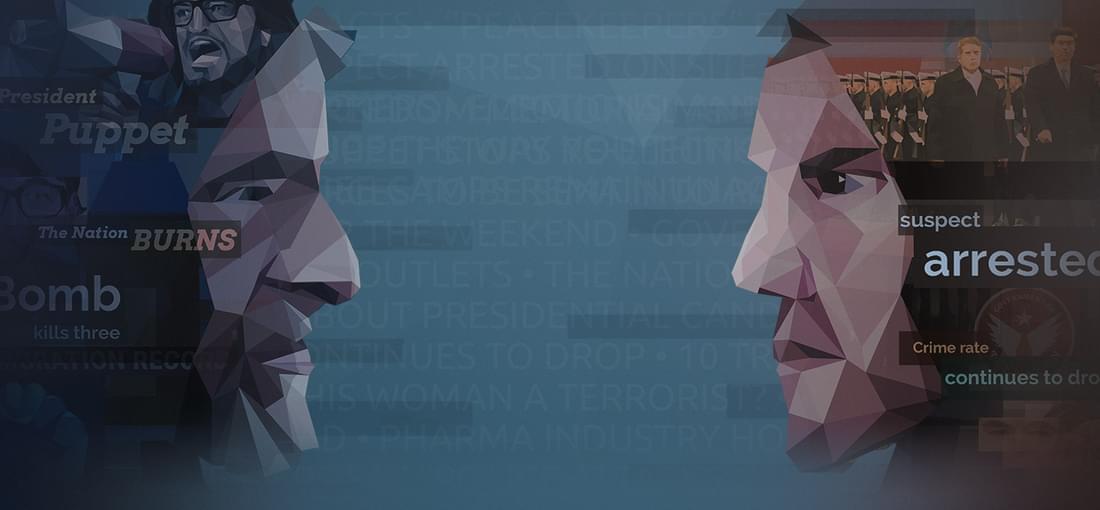


Do you remember, back in the day when there was no internet? When you were stuck on an island with basically just some three-headed monkeys? When you, a base-capped fatso, helped George Washington to an exploding cigar? Do you remember putting eggs in microwaves in mid-air? If you do remember at least some of those scenarios, chances are you did play through point-and-click adventure classics. And if you did, you are the target group for Thimbleweed Park. It comes in pixelated retro style. Modern gamers will not enjoy. It contains a lot of references to games from the 90s. Modern gamers will not enjoy. It has a lot of meta humour. Modern gamers will not reckon that special at all. It has hardly any cul-de-sacs in story design, there are -- almost -- no sudden endings. Modern gamers will not notice. It is pretty well-designed in terms of getting on in the game. Modern gamers will not know otherwise. It has some control shortcuts (the letter block to the left of the keyboard for the "verbs" or maps for quick travel or the middle mouse button for speech short-cuts). Modern gamers will still yawn by the lengths it will take just to move a character through the roads and paths, or will moan about (pointless) recurring animations, for instance when in an elevator or when climbing a radio antenna. It has a pretty good-quality texting. Modern gamers will still complain about ever-repetitive texts and about poor quality in side-texts (such as in a huge library, composed of backers' texts -- a neat idea, but no quality at all here). Compared to the old adventures played by people being able to focus longer than just half an hour on basically one and the same scenario, this game offers a lot of variety. For modern gamers, it is lame. Being one of the best adventures so far, it still falls short of modern gaming in every major respect. And even compared to classics its humour seems shallow. A must-play for fans! A solid game for all others, without major flaws.

The concept of the game reads nice: A blend of the retro-style discover-the-errors game "Papers Please!" on one hand and of the "Orwell" series which requires you to peek into citizen's lives for a surveillance organisation on the other. So far so excellent. The basic idea is that you need to collect surveillance evidence in order to catch criminals or have some (in?)justice served. This very idea would leave lots of room for exciting storylines, for obscure interconnectedness of people or secret organisations, for stuff you need to uncover by making sense of coincidences, using a plethora of utilities, spying into their bank accounts, their text messages, mails, criminal records, etc. As a game designer, you might use this opportunity to create individual storylines for at least some of the persons spied onto, you might sanction the choice of "show me the network of person X", if person X clearly has nothing to do with the cases at hand, by just producing an arbitrary number of people with their lives, thereby having one obviously wrong decision yield further problems of managing the data. You might have gone for a rather not-all-parallel storyline. You might have designed a really great simulation, with rewarding solid work and penalising bad work; might have gone for voice acting. This game did not. It does not reward good work. It simply ends once you do bad work. The assignments are simple, but not random. They closely stick to an ever-the-same storyline. No replayability at all. This game does not allow for sympathy for the people under scrutiny, as Orwell might have done. And you will always be heavily restricted in your "analysis" (which does not even deserve this label). A game for the dumb. But the worst thing is the controls and user interface. It is laden with time-consuming, unnecessary stuff which might have been solved a lot better by sticking to minimum standards. It is stressful to play due to its really bad design. Could have been so much more.

First and foremost: Overall, Mini Metro is a seriously good game. It would even be a next-to-brilliant game were it not for what I take to be one single flaw in its mechanics. The graphics are minimalistic, control is highly intuitive, and above all the overall concept is fascinating. It is a small and abstract game, so its players will not expect an overwhelming sound or realistic depiction of tube lining. The aim is to build networks of underground lines to various cities. There are underground customers who need to go to one out of a set of certain stops (indicated by a symbol shared by both this set of underground riders and their destination). As time goes by, more and more symbols pop up on the screen, some rather rare, others quite common. Your job is to prevent people from overcrowded stations waiting for the train to carry them the shortest possible way to their destination. Changing lines is possible. As more and less frequent symbols appear, and as the number of passengers increases over time, this can be rather tricky. Restrictions in passenger number per carriage or by water crossing requirements make matters more complex and difficult. So far so good. The one weakness of this game lies in its requirement to do active remodelling or resetting trains. Constantly having one more disposable line at hand and connecting with it just two or three stations which need urgent serving will be the only way to win in some of the cities. Therefore, this game is not so much about building a functioning underground network as it is about relief-connecting temporarily critical points. It is not about design. It is about reaction. In some cities, you may get along well by just building one great line network and upgrading it at times, but in others you will never be able to beat the game by doing so. Apart from this single, but rather severe criticism of inherent game mechanics, the game is really good and ought to serve as an example for neat game design.

As I did not want any of the second-grade spoiling, I played UI in its original language, German. While I reckon the game mechanics traditional, the way they should be with any point-and-click adventure, and even though the game sound seems really good, you are likely to run into a dead end sooner or later. This is due to the game-breaking logic used. Not only will the same "story-changer" dialogues appear more than once, but you will also not be provided necessary quest items such as a car key if you do not exactly stick to the chronological order of the "solution". If you do not follow the creators' order of events, if you walk into the wrong screens in the "right" succession, you will get stuck -- regardless of whether all your decisions correspond to those of the "best-practice solution". UI's humour is okay (it even had me laughing at one point, which is rare), even compared to classics in this genre, and voice-acting is good. Interactions are a bit limited, but that is fine. Puzzles range from easy to medium (which is totally sufficient, especially for essential puzzles to be solved in order to proceed). The graphics style does not meet my taste, but that is due to personal preference. Animation is extremely poor, cut scenes are mainly absent. UI has its upsides -- if by accident you proceed in the right order of meeting people and collecting items, and if you put up with the overall all-too-clear deficits in the graphics department. As far as the plot is concerned, UI is far less unforeseen than the name would suggest. Usually, I would have opted for three stars out of five: overall, the game would be good. Were it not for the fact that in Bochum and Heidelberg apparently they still cannot make a solid point-and-click adventure logic in the year of 2018! Those flaws would have been a shame to any 20-yr-old Lucas Arts game. It is only worth playing with a solution at hand. Otherwise you will get stuck without noticing it is the game's fault. Pathetic.

The basic idea is the same as that of the predecessor, and it boils down to this: You are $YourAvatarNameHere, a foreign-based employee of The Nation. And you will have been chosen for listening and reading into other people's conversations. You have access to web-sites and to NPCs' devices such as computers (almost void of data) or smartphones. There is an opposition forming. And your task is to make their claims and allegations implausible. Therefore you are connected to a cloud tool called "Orwell" (named after that Blair guy, apparently), and you may upload certain phrases / text blocks into this system, which will then make available new resources for digging up dirt. You are paired with an advisor who, though not capable of controlling your input into Orwell, tries to steer you through your actions. And assesses those chunks of data once uploaded. Based on what chunks you drag and drop, the story will take one path or the other. The overall topic here seems to be surveillance abuse and fabricating stories for an alleged common good. Game duration 3-6 hours. Even though I like the overall idea and shape of O:IS, I do not like the following: - The tutorial-style initial feedback by your data analyst cannot be turned off. Which makes playing yet another outcome annoying. - None of the endings is satisfying. You may continue playing after the final sequence, but things will not function properly then. This is bad design. - Once you hover over text chunks, you will be provided with a summary. Those summaries are flawed far too often though, leaving you in doubt whether or not to upload. - The drag-and-drop style costs a lot of time. In order to make certain inputs, you first need to find a text containing that input, then upload it only to be able to enter it. - Minor inconsistencies as well. - Read A LOT. Browse a lot. Tiresome. - You are not able to pick a "standard white-guy" character. Only minorities. - Pat plot, no twist. An okay game. Liked it.